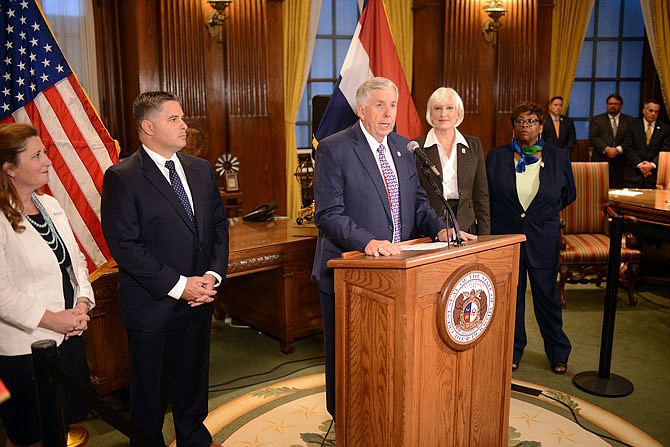The restructuring of some state departments that Gov. Mike Parson ordered in January became official Wednesday, with the goal of bolstering the state's economy.
Using executive orders, Parson earlier this year down-sized the state's Economic Development Department through moving offices to other state departments, some of which have been renamed:
Moving the Division of Energy to the Department of Natural Resources;
Moving the Division of Workforce Development and the Missouri Economic Research and Information Center to the Department of Higher Education and Workforce Development - formerly known as the Department of Higher Education;
And moving the Public Service Commission and Office of Public Counsel to the Department of Commerce and Insurance - formerly known as the Department of Insurance, Financial Institutions and Professional Registration.
The Missouri Arts Council was also moved to the Office of the Lieutenant Governor.
Parson said Wednesday the actions are a "huge step in the mission of transforming our approach to workforce and economic development in Missouri."
Rob Dixon, director of Economic Development, said his department is going from having about 865 employees to 177.
"We're going to be laser-focused and streamlined" in the department's work on things that matter to private sector employers - workforce development and infrastructure, Dixon said.
Zora Mulligan, commissioner of Higher Education and Workforce Development, said changes came about after 18 months of conversations with people around the state.
"One of the things that we heard most consistently in each of these communities was something that didn't surprise me, but the depth of emotion with which people said it did, and that was that people need to understand that there are a lot more good choices after high school than going to college," Mulligan said.
She said the department still believes strongly in the power of higher education, but "we also see that we need to think more broadly" about post-high school opportunities.
She added a goal is to have 60 percent of Missourians have a post-high school credential by 2025.
"Now we have the ability to help our utilities meet their environmental and regulatory requirements," DNR Director Carol Comer said of the restructuring in that department.
Comer said DNR and the Division of Energy have the opportunity to help advance Parson's emphasis on infrastructure investment, "by focusing on providing affordable and reliable energy generated right here in the state of Missouri."
Department of Commerce and Insurance Director Chlora Lindley-Myers said the restructuring in her department creates an opportunity to "create a fair and competitive market for insurance companies, financial institutions, utilities and various licensees in our state," in order to enhance the appeal for industry and people interested in doing business in the state.
"I don't think there's any doubt about that," Parson said in response to a reporter's question of whether he's optimistic the moves will improve Missouri's economy.
"I am thrilled to have the Missouri Arts Council as part of the Lieutenant Governor's Office. The arts, in all varieties, are important to Missourians, and I look forward to actively promoting their significance throughout the state," Kehoe said in a news release from Parson's office.
The same news release noted Senate Bill 68 also took effect Wednesday. That bill contains provisions about workforce and economic development - creating a grant for Missourians to go to post-secondary institutions; allowing the Department of Economic Development to include on its website how to contact workforce development boards; limiting administrative expenses for the state's One Start work training program; and authorizing the Department of Economic Development to offer tax credits to qualified manufacturing companies.
The bill defines a qualified manufacturing company as "a qualified company that manufactures motor vehicles and that manufactures a new product or has commenced making a manufacturing capital investment to the project facility. To receive tax credits, the qualified manufacturing company shall make a manufacturing capital investment of at least $500 million not more than three years following the Department's approval of a notice of intent and the execution of an agreement made under the program."

